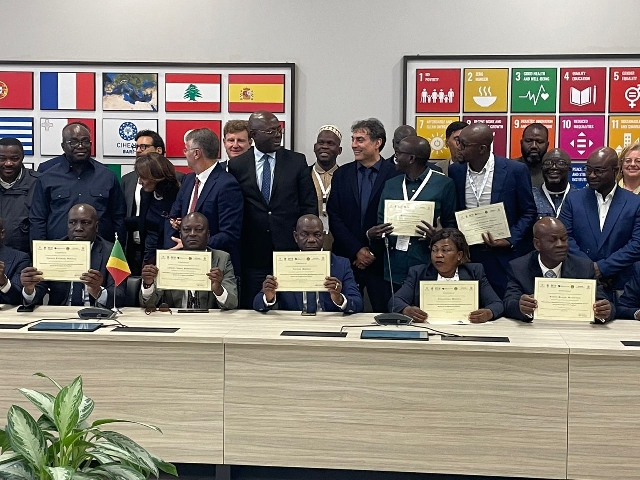Ghana secures €154 million from Italy to transform agri-food systems
 Agric Minister in Italy
Agric Minister in Italy
The Minister for Food and Agriculture, Hon. Eric Opoku, has secured a €154 million financing agreement from the Italian government under the project titled “Strengthening Agri-Food Ecosystems in Ghana” to boost food security and modernise the country’s agricultural value chain.
The project, operating under AID 013210, is a three-year initiative beginning in 2025 and ending in 2027. It seeks to improve food security and strengthen resilience to climate change through investments and public-private partnerships between Ghanaian and Italian agricultural institutions and private sector actors.
Under the project, 10,000 hectares of land will be developed into a model farm for the production of maize, rice, tomato, and soya. The farm will operate under full-year irrigation to ensure continuous production, with all produce targeted at supplying the domestic market.
An Italian organisation, the International Centre for Advanced Mediterranean Agronomic Studies (CIHEAM), will collaborate with Ghana’s Council for Scientific and Industrial Research (CSIR) to produce a soil testing and crop suitability chart to guide production and improve efficiency.
Additionally, CIHEAM will work with the West Africa Centre for Crop Improvement (WACCI) of the University of Ghana to establish a national seed bank.
Beyond agricultural production, the project includes significant social infrastructure development, with the construction of schools, toilet facilities, social centres, and ICT hubs for communities in the project area.
The general objective of the initiative is to improve food security and build climate-resilient local food systems aligned with the Sustainable Development Goals (SDGs).
Its specific objective focuses on developing and strengthening agri-food value chains, agricultural and civil infrastructure, and the capacities of institutions and local communities through targeted investments and partnerships.
The project is expected to deliver the following outcomes:
• 10,000 hectares of irrigated farmland cultivated and sustainably managed.
• Construction of social and community facilities to improve rural livelihoods.
• Enhanced institutional and technical capacity in modern farming systems and governance.
The direct beneficiaries include workers and staff of the model farm, soil analysts, seed bank agents, farmers’ associations, Ministry of Food and Agriculture officials, and young agricultural entrepreneurs. The indirect beneficiaries will be residents of the Aveyime-Battor rural area—approximately 23,000 people—and the wider Volta Region, home to over 1.6 million people, who will benefit from the project’s ripple effects and scalability.
Minister Eric Opoku’s participation at the Eighth Agrilevante Fair in Bari, Italy, from October 7–11, 2025, formed part of this broader collaboration with the Italian private sector aimed at transforming Ghana’s agri-food system into a more productive, inclusive, and sustainable sector.
Source: Classfmonline.com/cecil Mensah
Trending Business

ADB hosts National Farmers’ forum to honour 2025 award winners
06:17
JS Dumelo: Deputy Agric Minister urges politicians and state institutions to embrace, model commercial farming
17:31
GIPC explores investment partnerships with Greece in manufacturing and renewable energy
15:07
Ghana unveils US$3.4 billion plan to become continental leader in renewable energy
12:54
Interior Ministry gives bullion-van operators 45 days to meet new national safety standards
12:52
Parliament approves Health Ministry’s GH¢S 2.8bn budget, highest allocation so far
12:45
GIPC courts German investors with new economic incentives and industrial growth agenda
11:56
Inflation declines to 6.3% for Nov, 11 months in a row
12:57
Transport Ministry: Airport passenger service charge increased to GHS100
07:13
ASSMA's one-week ultimatum threat to mining sector peace, stability - Ghana Chamber of Mines
22:23




